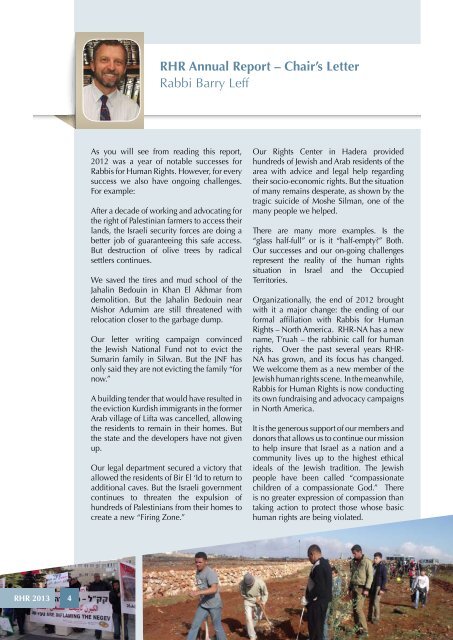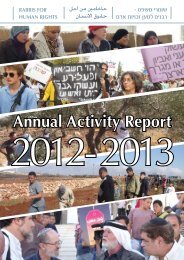Rabbis For Human Rights: The Annual Report 2012-2013
Rabbis For Human Rights: The Annual Report 2012-2013
Rabbis For Human Rights: The Annual Report 2012-2013
Create successful ePaper yourself
Turn your PDF publications into a flip-book with our unique Google optimized e-Paper software.
RHR <strong>Annual</strong> <strong>Report</strong> – Chair’s Letter<br />
Opening Word<br />
Rabbi Rabbi Arik Barry Ascherman Leff<br />
As you will see from reading this report,<br />
<strong>2012</strong> was a year of notable successes for<br />
<strong>Rabbis</strong> for <strong>Human</strong> <strong>Rights</strong>. However, for every<br />
success we also have ongoing challenges.<br />
<strong>For</strong> example:<br />
After a decade of working and advocating for<br />
the right of Palestinian farmers to access their<br />
lands, the Israeli security forces are doing a<br />
better job of guaranteeing this safe access.<br />
But destruction of olive trees by radical<br />
settlers continues.<br />
We saved the tires and mud school of the<br />
Jahalin Bedouin in Khan El Akhmar from<br />
demolition. But the Jahalin Bedouin near<br />
Mishor Adumim are still threatened with<br />
relocation closer to the garbage dump.<br />
Our letter writing campaign convinced<br />
the Jewish National Fund not to evict the<br />
Sumarin family in Silwan. But the JNF has<br />
only said they are not evicting the family “for<br />
now.”<br />
A building tender that would have resulted in<br />
the eviction Kurdish immigrants in the former<br />
Arab village of Lifta was cancelled, allowing<br />
the residents to remain in their homes. But<br />
the state and the developers have not given<br />
up.<br />
Our legal department secured a victory that<br />
allowed the residents of Bir El ‘Id to return to<br />
additional caves. But the Israeli government<br />
continues to threaten the expulsion of<br />
hundreds of Palestinians from their homes to<br />
create a new “Firing Zone.”<br />
Our <strong>Rights</strong> Center in Hadera provided<br />
hundreds of Jewish and Arab residents of the<br />
area with advice and legal help regarding<br />
their socio-economic rights. But the situation<br />
of many remains desperate, as shown by the<br />
tragic suicide of Moshe Silman, one of the<br />
many people we helped.<br />
<strong>The</strong>re are many more examples. Is the<br />
“glass half-full” or is it “half-empty?” Both.<br />
Our successes and our on-going challenges<br />
represent the reality of the human rights<br />
situation in Israel and the Occupied<br />
Territories.<br />
Organizationally, the end of <strong>2012</strong> brought<br />
with it a major change: the ending of our<br />
formal affiliation with <strong>Rabbis</strong> for <strong>Human</strong><br />
<strong>Rights</strong> – North America. RHR-NA has a new<br />
name, T’ruah – the rabbinic call for human<br />
rights. Over the past several years RHR-<br />
NA has grown, and its focus has changed.<br />
We welcome them as a new member of the<br />
Jewish human rights scene. In the meanwhile,<br />
<strong>Rabbis</strong> for <strong>Human</strong> <strong>Rights</strong> is now conducting<br />
its own fundraising and advocacy campaigns<br />
in North America.<br />
It is the generous support of our members and<br />
donors that allows us to continue our mission<br />
to help insure that Israel as a nation and a<br />
community lives up to the highest ethical<br />
ideals of the Jewish tradition. <strong>The</strong> Jewish<br />
people have been called “compassionate<br />
children of a compassionate God.” <strong>The</strong>re<br />
is no greater expression of compassion than<br />
taking action to protect those whose basic<br />
human rights are being violated.<br />
Occupied Territories<br />
RHR’s Occupied Territories Field Department, led by Rabbi Yehiel Grenimann, works to protect the rights of<br />
Palestinian farmers in the West Bank to safely access and work their lands throughout the year. An annual<br />
highlight is our Fall “Olive Harvest Campaign,” during which we bring hundreds of volunteers to work side<br />
by side with Palestinian farmers. After ten years, we now see a marked improvement in the willingness of<br />
the Israeli security forces to accept their responsibility (established in a court ruling in 2006) to ensure<br />
that farmers can reach olive trees in even the most dangerous locations. However, the scourge of olive tree<br />
destruction continues. Every year, RHR plants thousands of trees to replace those destroyed or damaged by<br />
settlers, or in areas in danger of takeover. We also advocate on behalf of the rights of the Jahalin Bedouin<br />
near Ma’aleh Adumim to remain on their lands, and run language courses and summer camps for children.<br />
This year, RHR and our coalition partners orchestrated international pressure forcing the Israeli security<br />
forces to commit not to forcibly move the Jahalin without an agreed upon plan for their welfare, but the<br />
intent is still to expel them. We also work in cooperation with other organizations to defend the rights of<br />
Palestinians to remain in their homes in East Jerusalem.<br />
“It is inspiring to work with so many good, devoted<br />
and idealistic people whose vision of peace and justice<br />
remains steady despite everything that happens. It is<br />
heartening to receive constant feedback emphasizing<br />
the importance of our presence as a religious Israeli<br />
group for human rights and to hear that we inspire<br />
hope in others, save Judaism (and humanism) for them,<br />
and break down stereotypes of both Israelis<br />
and Palestinians.<br />
RHR <strong>2013</strong> 4<br />
5 RHR <strong>2013</strong>









